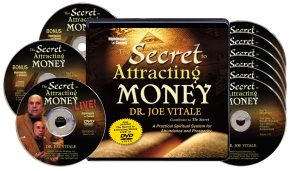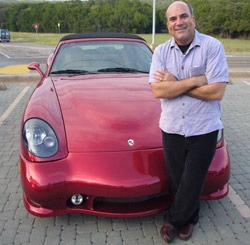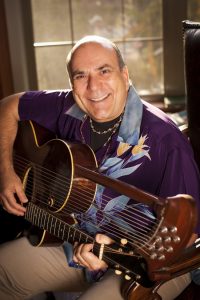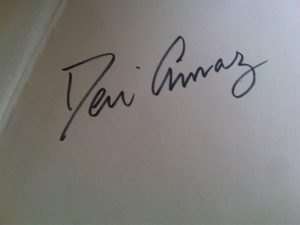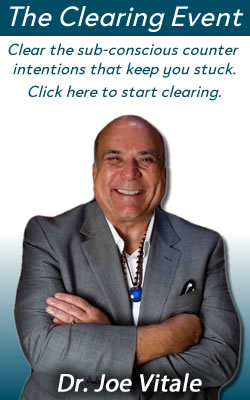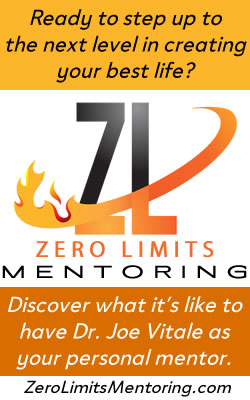Tag: coaching
ULP or How Good Can You Stand It?
Recently I gave a talk where I handed out copies of my books, audios, movies, etc, to each person who asked a question. The crowd loved it, as most crowds do.
It was also an illustration of the power of giving. I told stories of my giving money to causes and people, and even a beloved car to a friend, as examples that giving feels incredible.
But later at my booth a woman came up to me, explaining her dire financial circumstances, and asked for my help in choosing what product of mine to buy. She couldn’t decide.
As I talked with her, I learned she was a medic in the military. She was retiring soon and wanted to open her own business.
I thought about how our troops are helping us and decided I wanted to help back. So I handed her a copy of my bestselling CD and DVD course, The Secret to Attracting Money.
She refused it.
I explained that learning how to receive was an important part of growing.
She cried, still refusing the gift.
I kept talking and she finally accepted it.
But the experience made me wonder why it’s so hard for most of us to receive anything.
Then it was my turn.
Later the same day my friend, Lori Anderson, asked me what I would say if I were given a choice between two gifts.
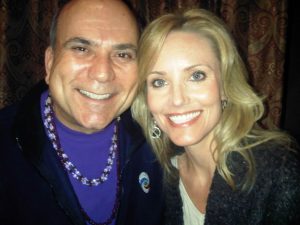
Lori Anderson
I was curious but suddenly vulnerable and protective.
She said, “I know you’re interested in the art work we saw earlier, and I know you’re interested in the handmade drum we saw. Which would you accept as a gift?”
I crossed my arms. I stared at Lori. I felt my heart open but yet my mind wanted to shut it all down. I was being offered a gift. A big one. Both were expensive. Both were treasures to me.
Knowing I had to tell the truth to remain in integrity, I replied, “The drum.”
“That’s what I thought,” she said. “I’ll go buy it for you.”
I stood there in shock. My body shook a little.
Why?
Years ago a coach would ask me and other clients, “How good can you stand it?”
He used the question as a way to probe our sense of deservingness. Most people self-sabotage when things get too good for their comfort zone. They feel they don’t deserve the extra good coming their way.
I’ve seen this behavior repeatedly in people. There have been people I have personally helped (at no charge) who suddenly reach a point where an inner switch goes off and they stop accepting my counsel. It’s been sad to see, as most of them have great potential (which is why I was helping them), but when they hit their ceiling for deservingness, they pulled back.
My friend Gay Hendricks puts it this way:
“What is the ‘Upper Limit Problem’? The ‘ULP’ is the human tendency to put the brakes on our positive energy when we’ve exceeded our unconscious thermostat setting for how good we can feel, how successful we can be, and how much love we can feel. The essential move we all need to master is learning to handle more positive energy, success and love.”
ULP it is.
I saw it that very same day when a friend I was freely helping suddenly insulted me by email, as an unconscious way to get me to halt my giving.
I saw it earlier that day with the medic who initially refused my gift.
And I saw it rear up in myself later still that same day when I was offered a one thousand dollar drum as a gift.
Learning to receive may be as powerful as learning to give. It’s a way to stretch your capacity to love.
Here’s the punchline to round out this story:
Later that very same day (yes, the same day) Mathew Dixon came up to me — not knowing any of the above — and told me of a drummer he met who was beaming with excitement because he had sold a special drum he made and he needed the money.
Of course, the drum he made was the one Lori bought and gifted to me.
Do you see the win-win-win?
The drummer made the sale, Lori got the joy of giving, and I received the beautiful drum.
And I absolutely love my drum.
Learn to give when you’re moved to do so — but also learn to receive when the moment comes.
How good can you stand it, anyway?
Ao Akua,
PS – If you’re ready to receive right now, go collect your free copy of my book, Attract Money Now. If you’re ready to give, tell somebody about it. 🙂
Heads Up: You can be one of the first to hear about my “Healing Music” CD by sending an email to [email protected]
Free Ho'oponopono Training
Whenever I spend time with Dr. Hew Len, I’m reminded of the fundamentals behind Zero Limits and the Hawaiian healing system called ho’oponopono:
There’s nothing to do but clean (i.e., release programs in the mind).
The more you clean, the more you can receive inspiration from the Divine.
You act from Memory or Inspiration, and usually it’s Memory (data).
The only thing to clean is what you feel inside; you’re clearing perception.
The only goal is freedom; to be at Zero.
Knowing the fundamentals is one thing, living them is quite another. This is why we sometimes need books, audios, DVDs, tools, seminars, coaches, and whatever else we can use to remind us that all the work takes place within.
This is why I’m excited to report that today you can have a free online training in ho’oponopono, taught by Dr. Hew Len and myself, by going to-
http://www.zerolimitsonline.com/free-hooponopono-training-lesson-1
The world is made up of “data” and it’s this very data that needs cleaned. The thing is, we perceive all that data as being outside of us, when in reality it’s inside us, so that’s where the cleaning has to take place.
In other words, there’s nothing “out there.” It’s all inside you. That’s where you experience problems and that’s where the cleaning needs done.
Dr. Hew Len often asks, “Have you ever noticed that when you have a problem, you are there?”
Think about that.
“Complete responsibility means accepting it all – even the people who enter your life and their problems, because their problems are your problems. They are in your life, and if you take full responsibility for your life, then you have to take full responsibility for what they are experiencing, too.” – from Zero Limits by Joe Vitale and Dr. Hew Len
But what is the right way to clean?
If cleaning is the number one most important thing to do and is the core of the entire Zero Limits and ho’oponopono process, how do you do it accurately?
Here’s how I do it:
I notice something I consider wrong. This can be triggered by a thought, another person, an event, or anything else. This is the stimulus. Before Zero Limits, noticing a problem was always considered “out there.” After Zero Limits, you realize the problem is inside. It’s actually a problem in perception. Whatever the case, the first step is to notice you don’t feel good. You’re angry, upset, worried, scared, or any other of a wide range of emotions and feelings that could be labeled as unhappy.
I start to clean on the feeling. I don’t clean on the other person, or the thought, or the situation, or anything “out there.” Again, the problem is inside. I’m the one aware of a problem. I’m the one who has to clean it. For me, saying “I love you”, “I’m sorry”, “Please forgive me” and “Thank you” is the way to clean. I say the phrases in any order. I say them non-stop in my mind while feeling the problem as I perceive it. And I say it to the Divine.
I sometimes use other cleaning methods. For example, the last time I saw Dr. Hew Len, he told me my own business card (the one with my red Panoz car on it called Francine) is a cleaning tool. He said, “In your mind imagine slicing the problem up with the edge of the card.”
I let go of need, addiction or attachment and wait to be prompted to take inspired action. Dr. Hew Len once told me that he cleans on a decision three times. If the answer is the same after those cleanings, he takes action on it. This means if I get an impulse to do something to resolve the perceived problem, I might clean on it three times before I actually take any action. This is a way to insure the action is coming from inspiration and not memory.
Repeat as needed.
Everyone wants a short-cut to cleaning and reaching Zero. I do, too.
But it’s that very impatience that needs cleaned. Wanting something right now is Memory playing out, urging us to get instant gratification. It’s data. The Divine has no sense of time and no urgency. Wanting things to unfold faster than they unfold is a wonderful opportunity to clean.
I keep cleaning because it makes me feel lighter, happier and healthier; it is a fast-track way for me to remove the data in my being so I can get closer to the Divine; and because it’s easy, effortless, and free.
Until the Divine gives me another way to clean, I’ll keep on cleaning.
Ao Akua,
Joe
PS – Remember, today’s free training in ho’oponopono, taught by me and Dr. Hew Len, is at
http://www.zerolimitsonline.com/free-hooponopono-training-lesson-1
Who Else Is Listening?
People often wonder why the Law of Attraction doesn’t seem to work for them. I’ve addressed topics like counter-intentions many times, which is part of the explanation. (You don’t attract what you consciously think, you attract what you unconsciously think.) But there’s also the issue of how you train your unconscious mind.
Let me explain:
Who’s listening when you say you are going to do something?
When you make an agreement with a friend, who’s listening besides your friend?
When you make an agreement with a company, who’s listening besides the company?
When you make an agreement with yourself, who’s listening besides you?
When you say you are going to do something – no matter how big or small – you best do it. Not only are other people listening, but so is your own unconscious mind. When you don’t keep your word, you communicate that nothing you say can be trusted.
I’m not just talking about legal agreements – though that’s part of the point. I’m talking about any agreement you make. And I’m spelling out that an “agreement” is any time you say you will do something.
Agree to meet for lunch at noon? That’s an agreement.
Agree to turn in the report by Friday at 3? That’s an agreement.
Agree to call a friend over the weekend? That’s an agreement.
So why am I stressing that not keeping these agreements is being heard by somebody other than you and whoever the agreement is with?
Here’s why:
Your own unconscious mind is listening.
When you say you will do something, and you don’t do it, you just taught yourself that you aren’t to be trusted. Or believed.
So the next time you say, “I intend to attract the perfect relationship,” your unconscious mind basically says, “How can I believe you? You didn’t keep your word before.”
As I mentioned above, people often wonder why the Law of Attraction doesn’t seem to work for them all of the time. Part of the answer is in how you trained yourself. When you say you intend to do something, and you don’t, you train your unconscious to distrust anything else you say.
But here’s the good news:
By the same token, when you say you will do something — however great or small — and you do it, you just trained your unconscious mind to trust you.
This is a way to build strength, inner conviction, and high integrity. And the next time you declare an intention or request to the Universe, it will believe you.
When you say you will do something, do it.
After all, you’re not the only one listening.
Ao Akua,
PS — Last year I declared I would create a music CD this year. My first one will be out on May 1st. I’ll be posting an article here soon about it, as well as about other “healing music” that you will love. I played a 1915 Gibson Harp Guitar on one track. (Pictured above) Sarah Marie sang on four of the tracks. Exciting stuff. Stay tuned.
"A Book" Lesson
I just completed reading the 1976 autobiography of Desi Arnaz, the late Cuban-born musician who married Lucille Ball and together created the legendary TV show, I Love You.
I love simple titles. His book is called A Book. It’s a joy to read. Desi was a riveting storyteller. He was smart, talented, persistent, creative, charming, and driven. He and Lucy became the most beloved television couple in history, as well as one of the wealthiest.
But he also went through hell before he ever arrived at success. As with most “overnight” successes, his career took decades to develop into something worth writing about.
What stood out for me in A Book is a lesson Desi learned from his father in Cuba. His father was mayor of Santiago. He was popular and successful. He owned land, businesses, and resort property. His father taught, “There is always a way.”
No matter what the challenge, problem, or circumstance, “There is always a way” to resolve it.
Desi saw this belief in action as a child. When the revolutionaries entered Cuba in the early 1930s, they burned down his family home, destroyed his crops, killed his animals, ran off his mother and family, and put his father in jail.
They went from a life of luxury to being homeless and penniless. They later escaped that country, went to Miami, and started a new life — with nothing at all.
But the belief, “There is always a way” kept them going.
Desi struggled, but kept working; kept taking action.
When opportunities came his way, he took them, even when he didn’t have the skills or experience on hand to pull off the opportunity. He knew he could attract or develop the skills as they were needed.
When asked if he could act, when he had never acted at all, he said, “All my life!” He then learned acting, appearing in several movies and of course later on television.
“There is always a way.”
When he and Lucy found themselves with the opportunity to be involved in a new TV show, they needed to find actors, raise funds, develop new camera methods, use a live audience, build a set, and much more — all firsts at the time with no paths to show what to do, and all with little or no money to make anything happen, and all under a time crunch that would make most people faint — they knew “There is always a way.”
When Lucy was accused of being a communist in the 1950s, Desi put on his fighting gloves and destroyed the rumor. Front-page headlines vindicated the redhead. Desi said the only thing red about Lucy was her hair, and even that was false.
Desi knew, “There is always a way.”
Reading Desi’s book was a real treat. Not only because I always loved him as Ricky Ricardo on I Love Lucy, but also because “There is always a way” is one of my beliefs, too. It’s in my book The Attractor Factor. It’s one of the prime directives in my operating belief system.
You may not know how to do something, but by taking action and moving forward you can find it, create it or invent it.
“There is always a way.”
I recently tweeted a quote from Martin Luther King, Jr. that recaps this lesson from A Book:
“Faith is taking the first step even when you don’t see the whole staircase.” – Martin Luther King, Jr.
You don’t need to have all the answers to begin working toward making your dreams come true.
You don’t need to have all the money to begin working toward making your dreams come true.
You don’t need to have all the experience or education or much of anything else to begin working toward making your dreams come true.
You just need to take action right now — while believing, as Desi proved — “There is always a way.”
Ao Akua,
PS – Right after reading Desi’s book, I read Lucille Ball’s autobiography, published after her death, titled Love, Lucy. Her early life was no party. She, too, struggled. But her persistence, talent, and hard work ultimately paid off. You can learn more principles of attracting what you want through my Miracles Coaching program. Meanwhile, enjoy Desi Arnaz in his prime and try not to smile in this early video of him that breathes the fire of life:
What's "Naturally" You?
A friend listened to the recent interview where Bob Baker* asked me questions about hypnotic marketing for musicians.
During it I plugged my music support team, from Sarah Marie and Mathew Dixon to Guy Monroe and Daniel Barrett. I also plugged my favorite singer, Michelle Malone, and talked about songwriters I love, such as Rob Thomas of Matchbox Twenty. And usually every time I mentioned someone, I gave out their website (just as I did in this very paragraph).
After it my friend said, “You’re a natural promoter.”
I smiled.
For the first few decades of my life, I had no idea what promotion was. I had to learn it. And then I had to make it second nature to me. So today it appears I’m a natural promoter.
But am I?
When I was in college in the early 1970s, broke and unhappy, a friend of mine said “You’re naturally pessimistic.”
Today people often comment, “Joe, you’re naturally optimistic.”
Well, which is it?
Am I naturally pessimistic or naturally optimistic?
What about you?
What are you “naturally” good at?
You have a tendency to lean one way or another in behavior right now based on your past habits. But you can also retrain yourself to lean in another direction with new habits.
- If you’re not happy, you can train yourself to be happy.
- If you’re not a promoter, you can train yourself to be a promoter.
- If you’re not skilled at a talent, you can train yourself to be skilled at it.
With enough training, people will look at you and say, “You’re naturally good at that.”
But we’ll both know the secret.
The secret to being naturally good at anything is focused practice.
Lots of it. I’m practicing the guitar every day. I’m writing songs almost daily. I’m reading books on singing, songwriting, and performing. I’m taking lessons. I’ve got a support team.
At one point soon, people will say, “You’re naturally good on guitar.”
What do you want to be naturally good at?
Get yourself a coach, build a support team, read, study and practice every day, and you, too, can be “naturally” good.
Naturally.
Ao Akua,
PS – * My interview with Bob Baker is at http://bob-baker-podcast.blogspot.com/2011/03/57-joe-vitale-interview-on-hypnotic.html

